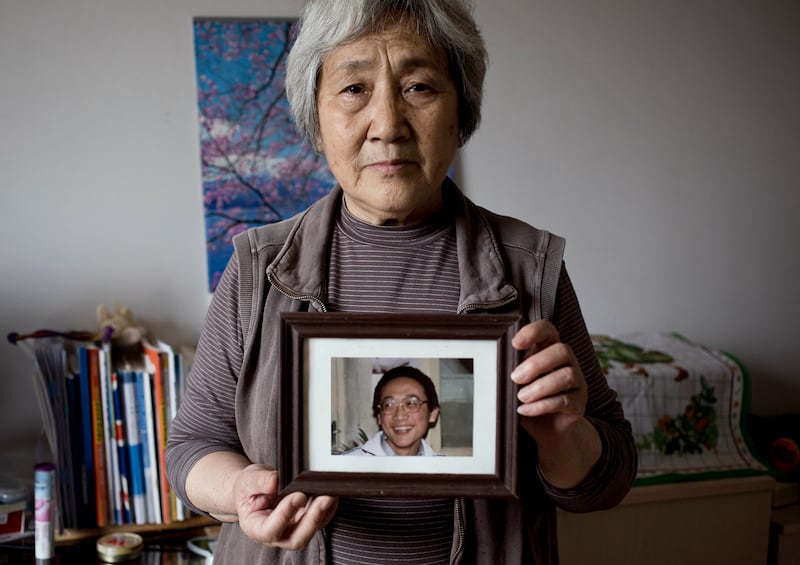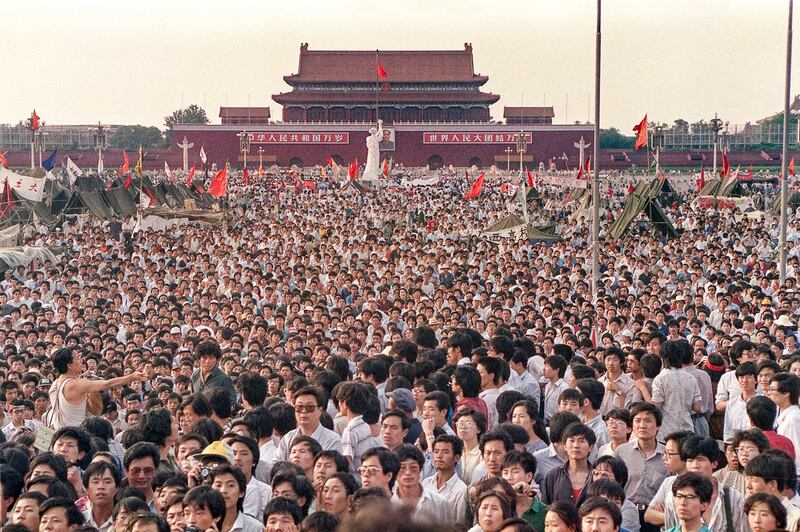Read about this topic in Mandarin.
Note: This article contains a graphic description that some readers may find upsetting.
An 88-year-old mother whose son died in the 1989 Tiananmen massacre has trouble even walking to a Beijing cemetery to commemorate his passing every June 4, but authorities still keep her under surveillance. “Am I that scary?” she asks.
Zhang Xianling is one of the founding members of the Tiananmen Mothers group that represents the families of victims of the crackdown on pro-democracy protesters that left hundreds if not thousands dead. The incident is expunged from the public record in China.
Each year, the mothers submit a letter to Chinese leaders, calling on the ruling communist party to publicize records about the June 4, 1989, incident, award compensation and to hold accountable those responsible for the killings.
Zhang told Radio Free Asia that although she is old, has difficulty getting about and needs a wheelchair, as long as her physical condition allows, she will definitely go to Beijing’s Wan’an Cemetery on June 4 to pay tribute to her son Wang Nan who died in the crackdown – as a group of mothers does each year.
Last year, on the eve of June 4, her phone line was cut and she lost contact with the outside world. This year, starting from April, she said she has been under close surveillance.

“They (the authorities) keep a close eye on me,” Zhang told RFA Mandarin, recounting how on a recent trip outside Beijing she got home around midnight and state security agents called her to say they would post someone outside her door.
“At 6:00 the next morning, they sent someone to guard my door. I don’t know why they are so afraid of me. I am 88 years old and I have to use a wheelchair if I have to walk 200 meters. Am I that scary?” she said.
Fallen silent
The annual gathering of the Tiananmen Mothers at the cemetery is a defiant act. Public commemoration of the massacre is banned in China. An annual candlelight vigil that for three decades marked the anniversary in Hong Kong’s Victoria Park has also fallen silent for the past five years amid a crackdown on pro-democracy activists there since Beijing tightened its grip over the once semi-autonomous territory.
While China has never made public the numbers who died or were injured on June 4, the Tiananmen Mothers published a detailed map in 2009 showing where some of the victims died. Estimates of the death toll have ranged from a few hundred to several thousand. June 4 is also a forbidden search term on the internet in China.
Zhang’s son Wang Nan was a 19-year-old student at Beijing’s Yuetan High School when he was shot dead by martial law troops in the wee hours of June 4 at an intersection north of the Great Hall of the People, according to a record of victims curated by the non-government group, Human Rights in China. The bullet entered the left side of his forehead and came out behind his left ear, leaving a bullet hole at the back of the motorcycle helmet he was wearing.
Troops buried Wang Nan’s body with others in a shallow grave west of Tiananmen Gate but heavy rains washed the soil away a few days later. His body was taken to a hospital morgue and was initially mistaken as that of a soldier as he’d recently returned from military training and was wearing an old military uniform. His family was only able to recover his body on June 14, and his cremated remains were interred at Wan’an Cemetery.
Promise not to see reporters
Thirty-six years on, and the anniversary of Wang Nan’s passing still looms large in Zhang’s life and remains politically sensitive.
Zhang said that she had protested against the authorities’ frequent deployment of guards at her gate. She said a policeman she had contacted about this had urged her against seeing journalists.

“They asked me to promise not to see reporters and not to say anything, I said, ‘I can’t do that.’ I said that if I spread rumors and you arrest me, I have no objection. I said everything I said is true. You (the Chinese government) don’t tell the truth, and if people come to ask me, won’t I tell it? If people come to me, whether they are reporters or not, I will tell them about June 4,” Zhang told RFA.
Zhang said she feels very sad every year when the anniversary of her son’s death approaches, and that the pain of losing him will not be diluted or erased by the years.
“Between April and June, if the current government didn’t say it was a sensitive period, I would (still) be sad,” she said. “As a mother, it is impossible for me to forget, especially such a sudden death.”
“The pain is deeply engraved in my heart. This is different from the original grief. It is a kind of pain. One is the pain of missing (him), and the other is the pain of not having resolved this matter.”
‘I will not stop fighting’
Zhang said that the members of Tiananmen Mothers are scattered and cannot meet often, but judging from the number of people who sign the open letter every year demanding answers, many of the victims’ families are as committed as she is, which has strengthened her belief and determination.

“I will not stop fighting,” she said. “We want to seek justice for those who died in the June 4 incident. We have this firm belief, so we have persisted up to now. I just want to tell my children that Mom is still persisting, and also to tell the authorities that we are still persisting.”
Zhang added that no matter how powerful the regime is, it cannot completely erase what has happened.
“The (June 4) massacre took place in full view of the public, so it is not something that will be easily forgotten. Although the candles in Victoria Park (Hong Kong) were blown out by the strong wind, the spark of justice is still burning in the hearts of every person with a conscience,” she said.
“As long as there is a spark, and one person commemorating, it is meaningful to our family … No matter how many people there are, it is a kind of comfort and support to us, and it also gives us spiritual strength.”
Edited by Mat Pennington.
rfa.org (Article Sourced Website)
#scary #Tiananmen #Mother #marks #sons #death #faces #surveillance
